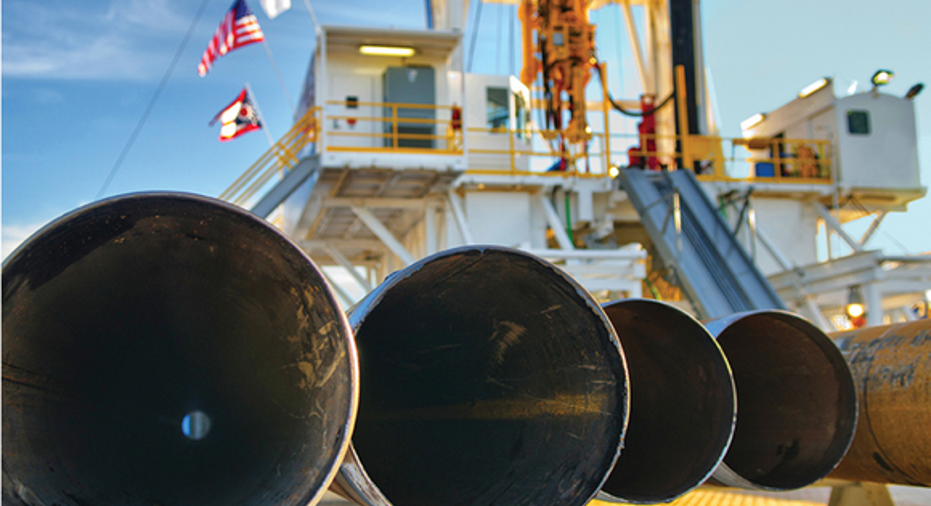Does Chesapeake Energy's Borrowing Limit Confirmation Signal the All-Clear?

Source: Chesapeake Energy corporate website.
How do you create several years of equity returns in a couple of days? It's pretty easy, really -- just buy shares of a company that then makes an announcement that removes what was perceived to be a risk of bankruptcy.
That's what Chesapeake Energy (NYSE: CHK) just did, and the market had a big change of opinion about the company's prospects:
Has the market overreacted to the recent news from Chesapeake and forgotten about the risks that still remain, or is there still plenty of upside yet to come?
What Chesapeake told us that the market lovedNorth American shale oil producers have had a rough go. They built up their companies expecting high oil prices to be with us for the long term, and then the bottom fell out in 2014.
North American shale gas producers have had it worse. The price of natural gas collapsed during the 2008-2009 financial crisis and really never recovered. These shale gas producers are currently trying to make do with a natural gas price that most of us thought wouldn't be seen again after the 1990s.
Henry Hub Natural Gas Spot Price data by YCharts
Chesapeake was struggling with its debt load at natural gas prices that were twice the current level. At current natural gas prices, Chesapeake, like most of its peers, isn't a viable long-term operation. Based on Chesapeake's share price in recent weeks, many investors thought Chesapeake's expiry date could be in the not-too-far future.
When Chesapeake announced that its lenders had confirmed that its $4 billion borrowing base wouldn't be reduced, the company's shares soared. The market loved that the banks wouldn't be curtailing Chesapeake's liquidity and pushing the company into a potentially fatal cash crunch.
Additionally, the banking syndicate provided temporary covenant relief by suspending the loan facility's senior secured leverage ratio through September 2017 and reducing interest coverage requirements. The next borrowing base review will be pushed out until 2017.
What this means is that Chesapeake has been given time to improve its balance-sheet situation. If natural gas prices can stage a significant rally, Chesapeake's situation will improve though both increased cash flows and the ability to sell assets at decent prices. A rise in oil prices would also help, as roughly 15% of Chesapeake's production is oil.
All of this kindness from Chesapeake's lenders didn't come without a pound of flesh. In exchange for the relief, Chesapeake pledged substantially all of the company's assets, including mortgages encumbering 90% of the company's proven oil and gas properties as collateral.
So much work done, so much left to goSince former CEO Aubrey McClendon left Chesapeake in 2013, the company has been working tirelessly on reducing its enormous debt burden. From the end of 2012 through the end of 2015, Chesapeake's total amount of leverage has been reduced from $21.25 billion to $11.7 billion, a reduction of $9.6 billion.
Source: Chesapeake Energy corporate presentation.
Had natural gas prices remained in the $3.50- to $4.00-per-mcf range where they were in 2012 through 2014, that debt reduction would have made a huge difference to the company. But when you reduce your debt by almost half while your cash flow also gets cut in half, your situation hasn't really improved much.
Chesapeake's cash flow from operations over the past three years is as follows:
- 2013: $4.6 billion
- 2014: $4.3 billion
- 2015: $1.2 billion
So while total debt has come down, the company's cash generation has come down even faster. Chesapeake needs to bring debt levels down further or have natural gas prices rebound and bring cash flows up. The clock is ticking.
Not with a 10-foot poleThe huge reduction in cash flows for companies such as Chesapeake means that drilling levels have plummeted. Natural gas production growth in the U.S. has slowed and is poised to finally stop. An argument could be made that at some point in 2016 U.S. natural gas production is not just going to stop growing but actually decline.
If that happens, natural gas should have a pretty big move, and so, too, would shares of Chesapeake Energy. The problem is that if natural gas doesn't move, Chesapeake Energy will still be in pretty dire straits. To own Chesapeake, you need to know that natural gas is going higher, and going higher soon. If natural gas stays down at current levels for another 18 months, this company may not make it through.
The reality is that there is no reason to ever own a company with that kind of risk attached to it. I'd have to be certain that natural gas prices are going to rebound in the next six months to own Chesapeake, and there's no way that I could ever be certain of that.
The article Does Chesapeake Energy's Borrowing Limit Confirmation Signal the All-Clear? originally appeared on Fool.com.
TMFWolfpack has no position in any stocks mentioned. The Motley Fool has no position in any of the stocks mentioned. Try any of our Foolish newsletter services free for 30 days. We Fools may not all hold the same opinions, but we all believe that considering a diverse range of insights makes us better investors. The Motley Fool has a disclosure policy.
Copyright 1995 - 2016 The Motley Fool, LLC. All rights reserved. The Motley Fool has a disclosure policy.



















